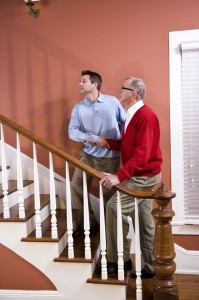Is it time to fall-proof your home?
 Did you know one out of three seniors falls each year? Such accidents can result in major injuries and can even increase your chances of early death. Luckily, falls – which occur most often at home – are largely preventable. Here are five ways to help limit the dangers:
Did you know one out of three seniors falls each year? Such accidents can result in major injuries and can even increase your chances of early death. Luckily, falls – which occur most often at home – are largely preventable. Here are five ways to help limit the dangers:
Stay active. Regular exercise can help reduce your risk of falls by improving your balance, strength, coordination and flexibility. Weight-bearing activities can also help slow bone loss from osteoporosis, which would make you less likely to incur a bone fracture during a fall. (Be sure to consult with your doctor before beginning an exercise regimen.)
Address safety hazards. Rugs and small furniture should be secured to the floor or removed from walking areas. The same goes for electrical cords and your pets’ food bowls.
Keep your home well-lit. This can help you avoid tripping over objects that are difficult to see in the dark. Place night lights in your bedroom, hallways and stairs.
Install hand rails in your bathroom. Wet floors can be especially slippery. Properly placed hand rails can help you get in and out of the shower more easily.
Talk to your doctor about any medications you’re taking. Dizziness and drowsiness are common side effects that could increase your chances of falling. In addition, have your eyes checked regularly to make sure your vision isn’t failing.
If you experience a fall, be sure to visit a doctor or emergency room for treatment, even if you don’t think you have any obvious injuries. The underlying cause of your fall might be treatable and you may want to explore physical therapy to feel more confident in your mobility.






